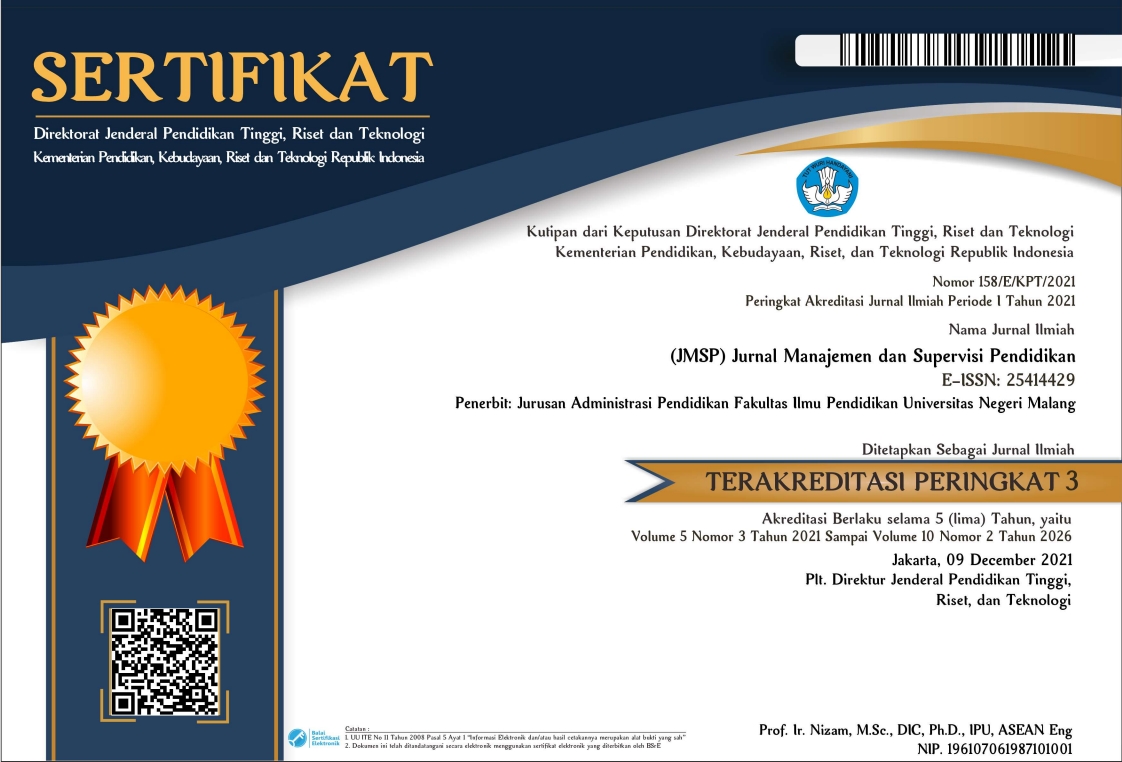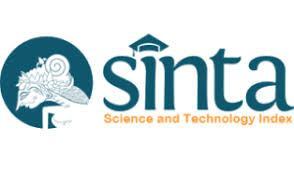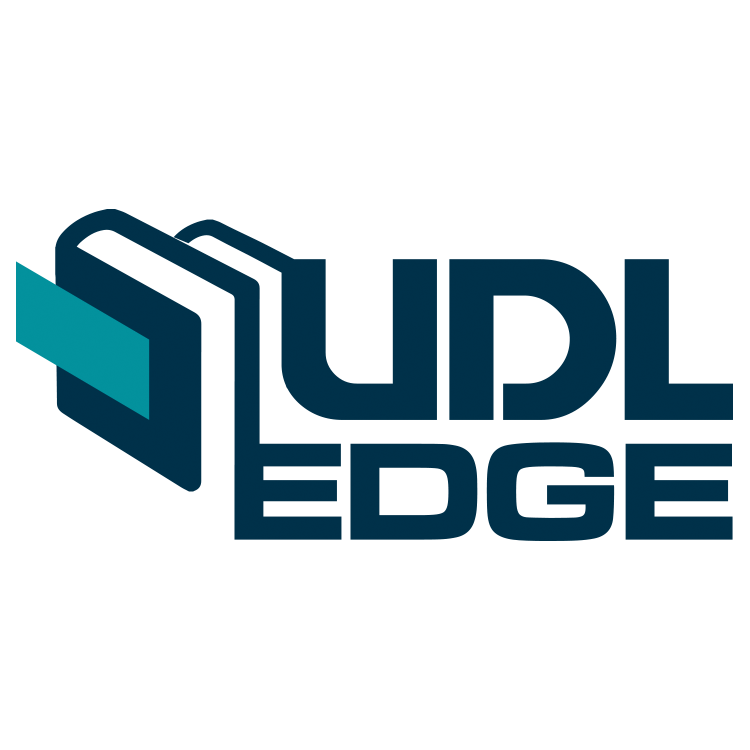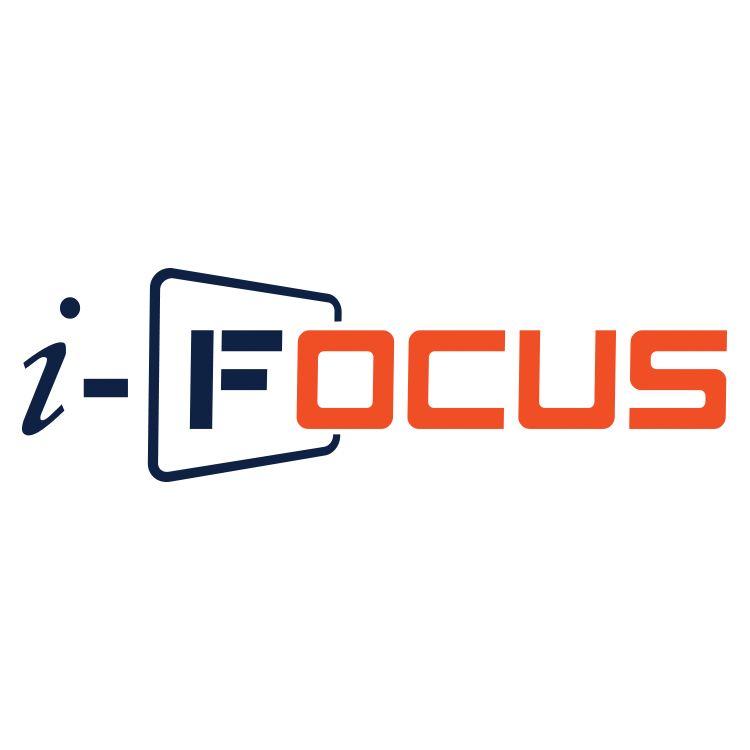Teacher’s ICT Competency: Principal Instructional E-Supervision and Learning Organization as Predictor for Technology Integration in the Classroom
Abstract
Keywords
Full Text:
PDFReferences
Adamy, P., & Heinecke, W. F. (1997). The Influence of Organizational Culture on Technology Integration in Teacher Education. The Journal of Technology and Teacher Education.
Adisel, A., & Prananosa, A. G. (2020). Penggunaan Teknologi Informasi dan Komunikasi dalam Sistem Manajemen Pembelajaran pada Masa Pandemi Covid 19. Journal Of Administration and Educational Management (ALIGNMENT), 3(1), 1–10. https://doi.org/10.31539/alignment. v3i1.1291
Agama, M. (2014). Kepala Madrasah. Direktorat Guru dan Tenaga Kependidikan Madrasah.
Asmarani, A., Susi Purwanti, & Suryawahyuni Latief. (2022). Pemanfaatan Teknologi Dalam Pelaksanaan Supervisi Pembelajaran Di Smp. Edutainment : Jurnal Ilmu Pendidikan Dan Kependidikan, 9(2), 83–91. https://doi.org/10.35438/e.v9i2.509
Bamrara, A. (2020). Integration of information and communication technology in teaching processes. Examining the Roles of Teachers and Students in Mastering New Technologies, 240–245. https://doi.org/10.4018/978-1-7998-2104-5.ch012
Basilio, M. B. (2021). Instructional supervision and assessment in the 21 st-century and beyond. Instutional Multidisciplinary Research and Development Journal (IMRaD Journal), 4(February), 1–8.
Benali, M., Kaddouri, M., & Azzimani, T. (2018). Digital Competence of Moroccan Teachers of English. International Journal of Education and Development Using Information and Communication Technology (IJEDICT), 14(2), 99–120. http://tpack.org/
Burhanuddin. (2017). Supervisi Pendidikan dan Pengajaran: Konsep, Pendekatan, dan Penerapan Pembinaan Profesional. Fakultas Ilmu Pendidikan Universitas Negeri Malang.
Caena, F., & Redecker, C. (2019). Aligning teacher competence frameworks to 21st century challenges: The case for the European Digital Competence Framework for Educators (Digcompedu). European Journal of Education, 54(3), 356–369. https://doi.org/10.1111/ejed.12345
Cakir, R. (2012). Technology integration and technology leadership in schools as learning organizations. Turkish Online Journal of Educational Technology, 11(4), 273–282.
Cifuentes, L., Maxwell, G., & Bulu, S. (2011). Technology integration through professional learning community. Journal of Educational Computing Research, 44(1), 59–82. https://doi.org/10.2190/ EC.44.1.d
Dalanggo, H. (2019). Strategi Perencanaan Supervisi Akademik Kepala Madrasah. Ideas: Jurnal Pendidikan, Sosial Dan Budaya, 5(4), 381. https://doi.org/10.32884/ideas.v5i4.226
Danial, A., Mumu, M., & Nurjamil, D. (2022). Model Supervisi Akademik Berbasis Digital Oleh Kepala Sekolah Dalam Meningkatkan Profesionalisme Guru PAUD. Jurnal Educatio FKIP UNMA, 8(4), 1514–1521. https://doi.org/10.31949/educatio.v8i4.3922
Danim, S. (2019). Literasi Pendidikan Era Revolusi Industri 4.0. In Prosiding Seminar Nasional Program Pasca Sarjana (PPS) Universitas PGRI Palembang. Universitas Negeri Malang.
de la Rama, J. M., Sabases, M., Antonion, A. F., Ricohermoso, C., Torres, J. M., Devanadera, A., Tulio, C., & Alieto, E. (2020). Virtual Teaching as the 'New Norm’: Analyzing Science Teachers’ Attitude toward Online Teaching, Technological Competence and Access. SSRN Electronic Journal, 7(17). https://doi.org/10.2139/ssrn.3654236
Delia Sari Batubara. (2018). Kompetensi Teknologi Informasi dan Komunikasi Guru SD/MI (Potret, Faktor-faktor, dan Upaya Meningkatkannya). Muallimuna: Jurnal Madrasah Ibtidaiyah, 3(1), 48–65. https://doi.org/10.31602/muallimuna.v3i1.954
Effendy, N. (2019). Meningkatkan Kemampuan Guru Dalam Melaksanakan Pembelajaran Melalui Supervisi Akademik Berbasis Teknologi Informasi dan Komunikasi (TIK) di SMPN 1 Jaro. Jurnal Penelitian Tindakan Dan Pendidikan, 5(1), 49–56. https://rumahjurnal.net/ptp/article/view/558
Glazer, E. M., Hannafin, M. J., Polly, D., & Rich, P. (2009). Factors and interactions influencing technology integration during situated professional development in an elementary school. Computers in the Schools, 26(1), 21–39. https://doi.org/10.1080/07380560802688257
Guntoro, D., Sumaryanto, T., & Rifai, A. (2016). 22 EM5 (2) (2016) Educational Management PENGEMBANGAN MODEL SUPERVISI AKADEMIK BERBANTUAN E-SUPERVISION BERBASIS WEB Info Artikel. Educational Management, 2(2), 122–128. http://journal. unnes.ac.id/sju/index.php/eduman
Harris, A., & Jones, M. (2018). Leading schools as learning organizations. School Leadership and Management, 38(4), 351–354. https://doi.org/10.1080/13632434.2018.1483553
Hatlevik, O. E. (2017). Examining the Relationship between Teachers’ Self-Efficacy, their Digital Competence, Strategies to Evaluate Information, and use of ICT at School. Scandinavian Journal of Educational Research, 61(5), 555–567. https://doi.org/10.1080/00313831.2016.1172501
Hoy, & Miskel. (2013). Educational administration: Theory, reserch and practice (9th Ed.). In McGraw-Hill (9th ed.). McGraw-Hill Companies, Inc.
Imron, A. (2011). Supervisi Pembelajaran Tingkat Satuan Pendidikan (Issue November). Bumi Aksara.
Johannesen, M., Øgrim, L., & Giæver, T. H. (2014). Notion in motion: Teachers’ digital competence. Nordic Journal of Digital Literacy, 2014(4), 300–312. https://doi.org/10.18261/issn1891-943x-2014-04-05
Junedi, B., Mahuda, I., & Kusuma, J. W. (2020). Optimalisasi keterampilan pembelajaran abad 21 dalam proses pembelajaran pada Guru MTs Massaratul Mut’allimin Banten. Transformasi: Jurnal Pengabdian Masyarakat, 16(1), 63–72. https://doi.org/10.20414/transformasi.v16i1.1963
Karakose, T., Polat, H., & Papadakis, S. (2021). Examining teachers’ perspectives on school principals’ digital leadership roles and technology capabilities during the covid-19 pandemic. Sustainability (Switzerland), 13(23), 13448. https://doi.org/10.3390/su132313448
Karwanto. (2022). Pengelolaan Supervisi Akademik Berbasis Digital. Akademia Pustaka.
Kools, M., Stoll, L., George, B., Steijn, B., Bekkers, V., & Gouëdard, P. (2020). The school as a learning organisation: The concept and its measurement. European Journal of Education, 55(1), 24–42. https://doi.org/10.1111/ejed.12383
Kuncoro, K. S., Sukiyanto, S., Irfan, M., Amalia, A. F., Pusporini, W., Wijayanti, A., & Widodo, S. A. (2022). Peningkatan Literasi Digital Guru Guna Mengatasi Permasalahan Pembelajaran di Era Pandemi Covid-19. Abdi Wiralodra : Jurnal Pengabdian Kepada Masyarakat, 4(1), 17–34. https://doi.org/10.31943/abdi.v4i1.50
Kyle Ingle, W. (2009). The Basic Guide to Supervision and Instructional Leadership (2nd ed.). In Journal of Educational Administration (Vol. 47, Issue 2). Pearson Education Inc. https://doi.org/10.1108/09578230910941084
Latip, A. (2020). Peran Literasi Teknologi Informasi Dan Komunikasi Pada Pembelajaran Jarak Jauh Di Masa Pandemi Covid-19. EduTeach : Jurnal Edukasi Dan Teknologi Pembelajaran, 1(2), 108–116. https://doi.org/10.37859/eduteach.v1i2.1956
Lee, M., & Louis, K. S. (2019). Mapping a strong school culture and linking it to sustainable school improvement. Teaching and Teacher Education, 81, 84–96. https://doi.org/10.1016/j.tate. 2019.02.001
Maddin, E. (2014). Systems Thinking and Technology Leadership in PK-12 Schools Ellen Maddin, Northern Kentucky University. EdTechnology Ideas, 9(4). https://www.academia.edu/ 7693820/Article_9_Issue_4_Systems_Thinking_and_Technology_Leadership_in_PK_12_Schools
Mohan, P., & Chand, D. (2019). Mathematics teachers’ professional learning: Impact of story sharing and reflective dialogue. Waikato Journal of Education, 24(2), 73–81. https://doi.org/10.15663/ wje.v24i2.668
Moltudal, S., Krumsvik, R., Jones, L., Eikeland, O. J., & Johnson, B. (2019). The Relationship Between Teachers’ Perceived Classroom Management Abilities and Their Professional Digital Competence Experiences from Upper Secondary Classrooms. A Qualitative Driven Mixed Method Study. Designs for Learning, 11(1), 80–98. https://doi.org/10.16993/dfl.128
Mustabsyiroh, N., Prestiadi, D., & Imron, A. (2021). Implementation of Virtual Academic Supervision as an Effort to Increase Teacher Competence in The Covid-19 Pandemic. Advances in Social Science, Education and Humanities Research, 589(Iccoet), 112–115.
Naranata, I. G. N. (2021). Supervisi Akademik Dengan Aplikasi Zoom Meeting Dan Google Form Untuk Meningkatkan Kinerja Guru Dalam Pembelajaran Daring Di Sma Negeri 1 Kuta Utara. Suluh Pendidikan, 19(2), 132–145. https://doi.org/10.46444/suluh-pendidikan.v19i2.353
Newmann, F. M. A. A. (1996). Authentic achievement: Restructuring schools for intellectual quality: Vol. Jossey-Bas. Jossey Bass Publishers.
OECD. (2019). PISA 2018 insights and interpretations. OECD Publishing, 64.
Ouma, G., Awuor, F., & Kyambo, B. (2013). E-Learning Readiness in Public Secondary Schools in Kenya. European Journal of Open, Distance and e-Learning, 16(2), 97–110. http://www.eurodl.org/materials/contrib/2013/Ouma_et_al.pdf
Owen, S. M. (2015). Teacher professional learning communities in innovative contexts: ‘ah hah moments’, ‘passion’ and ‘making a difference’ for student learning. Professional Development in Education, 41(1), 57–74. https://doi.org/10.1080/19415257.2013.869504
Paulus, M. T., Villegas, S. G., & Howze-Owens, J. (2020). Professional Learning Communities: Bridging the Technology Integration Gap Through Effective Professional Development. Peabody Journal of Education, 95(2), 193–202. https://doi.org/10.1080/0161956X.2020.1745610
Prilianti, R. (2020). Model Supervisi Akademik Berbantuan Elektronik bagi Pengawas Madrasah di Provinsi Jawa Tengah. Prosiding Seminar Nasional Pascasarjana 2020, 1(1), 1–12. https://proceeding.unnes.ac.id/index.php/snpasca/article/download/610/529
Purnomo, E. N., Imron, A., Wiyono, B. B., Sobri, A. Y., & Dami, Z. A. (2023). E-Leadership, Technology Acceptance and Technological Self-Efficacy: Its Effect on Teacher Attitudes in Using Virtual Learning Environments. Pegem Journal of Education and Instruction, 13(4), 189–198. https://doi.org/10.47750/pegegog.13.04.23
Rasmuin, & Widiani, D. (2021). Strategy and Implementation of Character Education in Era of Society 5.0. Proceedings of the International Conference on Engineering, Technology and Social Science, 575–582. https://doi.org/10.2991/assehr.k.210421.084
Redmann, D., & Kotrlik, J. (2011). Analysis of Technology Integration in the Teaching-Learning Process in Selected Career and Technical Education Programs. Journal of Vocational Education Research, 29(1), 3–25. https://doi.org/10.5328/jver29.1.3
Rikkerink, M., Verbeeten, H., Simons, R. J., & Ritzen, H. (2016). A new model of educational innovation: Exploring the nexus of organizational learning, distributed leadership, and digital technologies. Journal of Educational Change, 17(2), 223–249. https://doi.org/10.1007/s10833-015-9253-5
Rupiah, R. (2021). Utilization of Information and Communication Technology (Ict) in Academic Supervision During the Covid-19 Pandemic. Jurnal As-Salam, 5(2), 120–128. https://doi.org/10.37249/assalam.v5i2.304
Samiya Ma’ayis Mohammad Syahidul Haq. (2022). Implementasi Model Supervisi Akademik Digital (E-Supervisi) Di Era Pandemi Covid-19. Jurnal Inspirasi Manajemen Pendidikan, 10 No. 1(1), 142–155.
Satria, R., & Mustiningsih, M. (2019). Supervisor in Era Industrial Revolution 4.0 and Society 5.0. International Conference on Education and Technology, 382, 596–601. https://doi.org/ 10.2991/icet-19.2019.147
Selwyn, N. (2010). Schools and schooling in the digital age: A Critical analysis. In Schools and Schooling in the Digital Age: A Critical Analysis. Routledge. https://doi.org/10.4324/ 9780203840795
Senge, P. M. (1991). The fifth discipline, the art and practice of the learning organization. In Performance + Instruction (Vol. 30, Issue 5). Currency Doubleday. https://doi.org/10.1002/ pfi.4170300510
Shelly, G. B., Cashman, T. J., Gunter, G. A., & Gunter, R. E. (2007). Teachers discovering computers: integrating technology and digital media in the classroom (5th ed., Vol. 2). Thomson. http://books.google.com/books?id=DvQ2FssIjoYC&pgis=1
Skantz-Åberg, E., Lantz-Andersson, A., Lundin, M., & Williams, P. (2022). Teachers’ professional digital competence: an overview of conceptualisations in the literature. Cogent Education, 9(1). https://doi.org/10.1080/2331186X.2022.2063224
Subandiyo, S. (2016). Meningkatkan Kemampuan Guru dalam Melaksanakan Proses Belajar Mengajar melalui Supervisi Kelompok. Jurnal Manajemen Dan Supervisi Pendidikan, 1(1), 42–51. https://doi.org/10.17977/um025v1i12016p042
Sugiyono. (2019). Metode Penelitian Kuantitatif, Kualitatif dan R&D. Alfabeta.
Suryana, D. (2013). Metode Penelitian Kualitatif Dan Kuantitatif. In Sutopo (Ed.), A psicanalise dos contos de fadas. Tradução Arlene Caetano. Alfabeta.
The Economist. (2022). The Inclusive Internet Index, supported by Meta. Economist Impact. https://impact.economist.com/projects/inclusive-internet-index/2022
Thoma, J., Hutchison, A., Johnson, D., Johnson, K., & Stromer, E. (2017). Planning for Technology Integration in a Professional Learning Community. Reading Teacher, 71(2), 167–175. https://doi.org/10.1002/trtr.1604
Todorova, A., & Osburg, T. (2010). Conditions and Effects of Teacher Collaboration within a Blended Professional Development Program for Technology Integration. European Conference on Technology Enhanced Learning, 6383 LNCS, 438–444. https://doi.org/10.1007/978-3-642-16020-2_34
Vinet, L., & Zhedanov, A. (2011). A “missing” family of classical orthogonal polynomials. Journal of Physics A: Mathematical and Theoretical, 44(8), 81–87. https://doi.org/10.1088/1751-8113/44/8/085201
Vodopivec, J. L. (2011). Some Aspects of Teaching Media Literacy To Preschool Children in Slovenia From a Perception Standpoint of Teachers and Parents. Acta Didactica Napocensia, 4(2/3), 69–78.
Wastiau, P., Blamire, R., Kearney, C., Quittre, V., Van de Gaer, E., & Monseur, C. (2013). The Use of ICT in Education: A survey of schools in Europe. European Journal of Education, 48(1), 11–27. https://doi.org/10.1111/ejed.12020
Wiyono, B. B., Burhanuddin, & Maisyaroh. (2020). Comparative effect of the supervision of the principal and quality of organizational management in school education. Utopia y Praxis Latinoamericana, 25(Extra10), 1–13. https://doi.org/10.5281/zenodo.4155681
Wiyono, B. B., Samsudin, Imron, A., & Arifin, I. (2022). The Effectiveness of Utilizing Information and Communication Technology in Instructional Supervision with Collegial Discussion Techniques for the Teacher’s Instructional Process and the Student’s Learning Outcomes. Sustainability (Switzerland), 14(9). https://doi.org/10.3390/su14094865
Wiyono, B. B., Supriyanto, A., Maisyaroh, M., & Indreswari, H. (2021). The Diagnostic Feedback Supervision Model based on Information Technology as the New Strategy to Improve the Professional Competence of Academic Personnel in School Organization. International Conference on Intelligent Engineering and Management, 46–51. https://doi.org/10.1109/ ICIEM51511.2021.9445370
Wiyono, B. B., Wedi, A., Ulfa, S., & Putra, A. P. (2021). The use of information and communication technology (Ict) in the implementation of instructional supervision and its effect on teachers’ instructional process quality. Information (Switzerland), 12(11), 1–16. https://doi.org/ 10.3390/info12110475
Xie, L. (2019). Leadership and organizational learning culture: a systematic literature review. European Journal of Training and Development, 43(1–2), 76–104. https://doi.org/10.1108/EJTD-06-2018-0056
Zorfass, J., & Remz, A. R. (1992). Successful Technology Integration: The Role of Communication and Collaboration. Middle School Journal, 23(5), 39–43. https://doi.org/10.1080/00940771. 1992.11496076
DOI: http://dx.doi.org/10.17977/um025v8i22024p111
Refbacks
- There are currently no refbacks.
Copyright (c) 2024 JMSP (Jurnal Manajemen dan Supervisi Pendidikan)

This work is licensed under a Creative Commons Attribution 4.0 International License.









